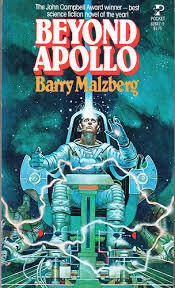What do you think?
Rate this book


153 pages, Mass Market Paperback
First published January 1, 1972

 a mystery in space of How Did the Captain of the Venusian Expedition Die? is not the mystery in space
a mystery in space of How Did the Captain of the Venusian Expedition Die? is not the mystery in space
 the mystery in space is the mystery of the inner space
the mystery in space is the mystery of the inner space
 the mystery of the confined madman and hopeful author and failed husband and tragic victim and master of projection and master of binary thinking and yet still somehow the master of accepting all probabilities all potentialities all things and possible murderer and time traveler and a lover both impotent and hyper-potent, the lone survivor, the unhappy astronaut Col. Harry Evans
the mystery of the confined madman and hopeful author and failed husband and tragic victim and master of projection and master of binary thinking and yet still somehow the master of accepting all probabilities all potentialities all things and possible murderer and time traveler and a lover both impotent and hyper-potent, the lone survivor, the unhappy astronaut Col. Harry Evans
 the mystery of the space between a man and a woman, a man and a man, a man and himself
the mystery of the space between a man and a woman, a man and a man, a man and himself
 the mystery of sex, the banality of it, its constancy in the mind and its transformation of the body, its shaping of things into shapes shameful and quickly hidden away
the mystery of sex, the banality of it, its constancy in the mind and its transformation of the body, its shaping of things into shapes shameful and quickly hidden away
 the mystery of a genre called New Wave Science Fiction, barely remembered, a genre that challenged its own genre and a genre that blazed bright and briefly and full of a strange stylized mockingly literary playfulness, a genre that pushes all sorts of buttons and pulls all kinds of levers, my mind moving in all directions, sparking and flashing, a constant smile on my lips at the ingenuity of it all
the mystery of a genre called New Wave Science Fiction, barely remembered, a genre that challenged its own genre and a genre that blazed bright and briefly and full of a strange stylized mockingly literary playfulness, a genre that pushes all sorts of buttons and pulls all kinds of levers, my mind moving in all directions, sparking and flashing, a constant smile on my lips at the ingenuity of it all
 as for the mystery in question, a sad Earthly answer: your wife no longer loves you, why is that why is that, perhaps a trip to Venus will solve this riddle, perhaps you can write a book, perhaps you can recreate reality, perhaps you can run away, perhaps things will be better then but
as for the mystery in question, a sad Earthly answer: your wife no longer loves you, why is that why is that, perhaps a trip to Venus will solve this riddle, perhaps you can write a book, perhaps you can recreate reality, perhaps you can run away, perhaps things will be better then but 
One of the theories of the new mystics was that all of space was merely a projection of the inner wastes of man and that space exploration therefore became merely another dull metaphor for internal exploration: up against Mars, Venus, Ceres or the moon the voyager was merely confronting one or another pyramid reared in his own damaged psyche. Under this theory, the rationalization for space exploration became preposterous. One would have been better off accepting from the beginning the internal truth of oneself or, failing that, seeking competent care in an institution where for relaxation cryptograms, hairgrayers, puzzles, and sexual biography would serve the essential purposes while keeping allotted time free for introspection and the consideration of inner space.

...we will instead write sixty-seven chapters - I think of the novel as having many chapters, some of them interlocking, others never seeming to fit at all; a crazy dazzle this, but I am no novelist... (97)The reader might feel sympathy with Evans' therapist who, desperately trying to get to the bottom of things, loses patience and possibly his own mind. (His name, Forrest, suggests to me someone lost in a dark one.)